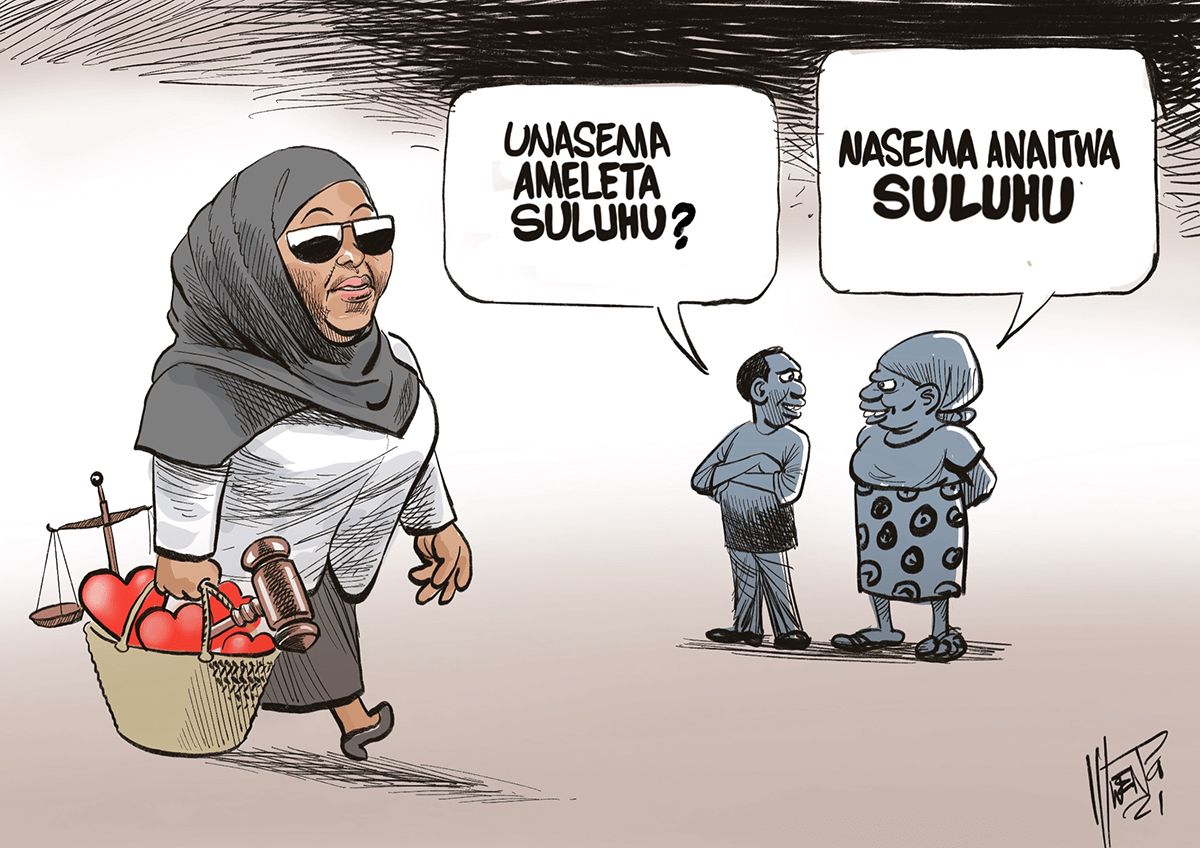
On 19 March 2021, Samia Suluhu Hassan was sworn in as the President of the United Republic of Tanzania following the death of President John Magufuli. Before the nation could take a deep breath, before the people could grasp it all, and before we could lay the former president to rest, we witnessed an unprecedented transfer of power. The instruments of power were smoothly transferred. As the presidential baton was passed to the Vice-President, her swearing-in was celebrated across the region and globally.
As we mark the first 100 days in office for the new president, the biggest achievement is the successful transfer of power, with many firsts that came with it – First Woman, First Zanzibari-born and even First Hijab wearing woman to become a President of a country in Africa. This article may even end up here and suffice to mark the 100 days.
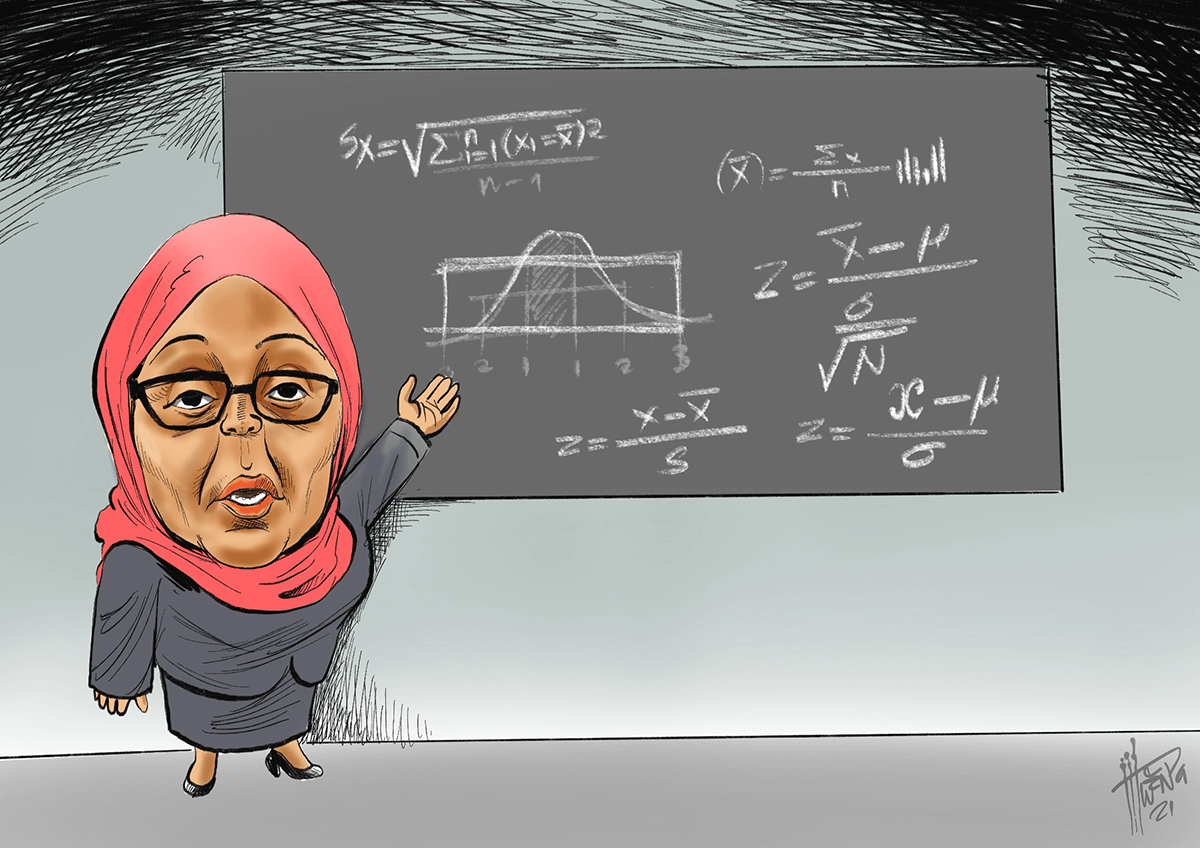
However, as I assessed President Magufuli first 100 days in February 2016, I am obliged to assess President Samia too. I used the terms PERFECTIONIST and TRANSFORMATIVE in assessing the first 100 days of the former president, concluding that he was a mere perfectionist of the status quo. Many people, some who later became staunch critics of President Magufuli, opposed my views vehemently as they saw him as a transformative leader. Time has proved itself to be the answer. With time, they also came to agree that he was not.
I will use the same terms to assess President Samia in her first 100 days. As such, I will make my conclusions as I see things through her actions and inactions. To give my take on her presidency, I will mostly paraphrase and rephrase as I revisit the same article that I wrote five years ago on her immediate predecessor.
President Samia started to take actions and make rhetorical statements that sent a message that her administration was different, but also not so. Her first speech recognized the opposition, which was very uncharacteristic of her predecessor. Later, she warned against injustices in tax collection and called for a better business environment, which was also antithetical to her predecessor.
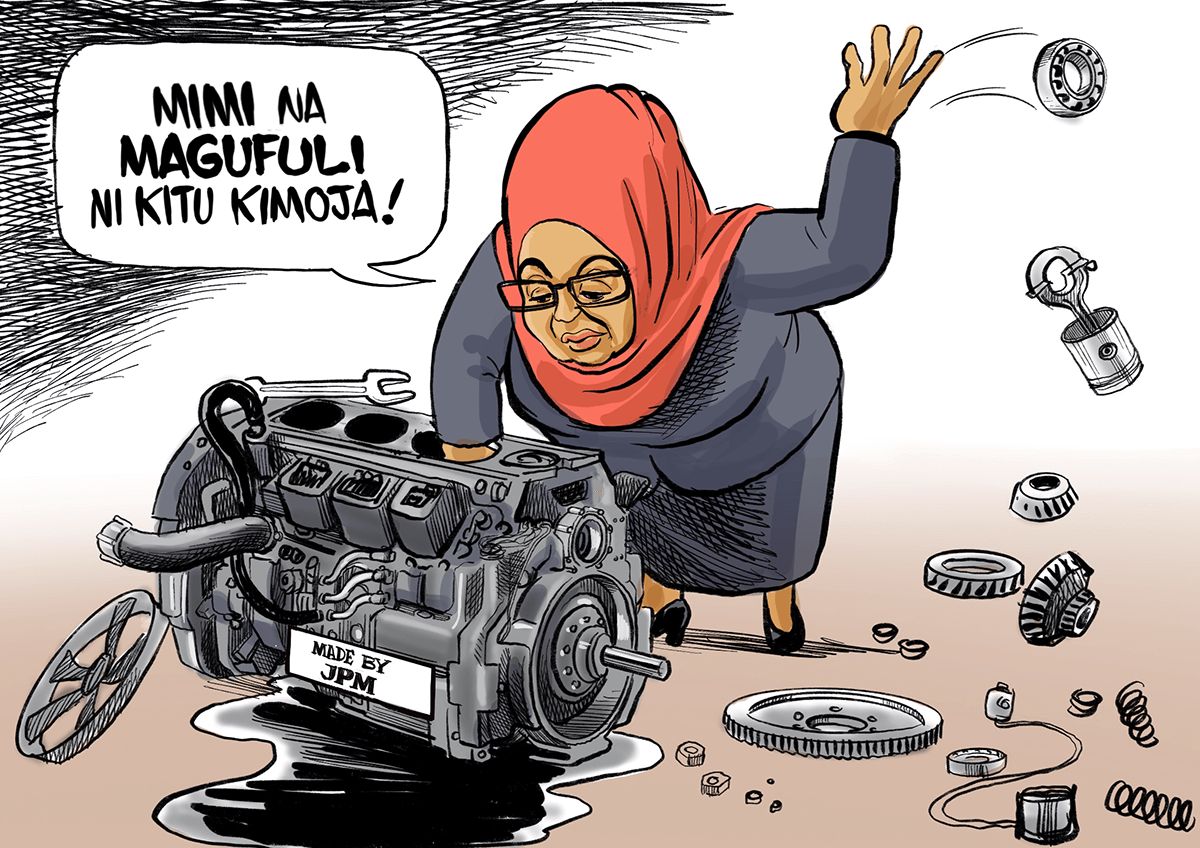
But, confusingly, she told us her and her predecessor were one and the same. One cartoonist had the best description of this. A cartoon of a lady throwing away parts of a car engine while singing that it was all the same.
Samia is arguably a welcomed leader. Many of us have celebrated her actions. For the people who have tirelessly been advocating for a just government – one that does not throw people in jail on framed charges, that does not shut up any opposing whisper or shoots its opponents in daylight, and that does not infringe fundamental freedoms of individuals and close civic space – she has indeed become a warmly welcomed leader.
As of the date of writing this article, more than 200 people have been freed from jails across the country, including 36 clerics who stayed in jail for eight years without their case being heard in court. The new Director of Public Prosecutions (DPP), Sylvester Anthony Mwakitalu continues to free more people. He has also publicly spoke about compensating those who were forced to pay for their freedom in the name of plea bargain.
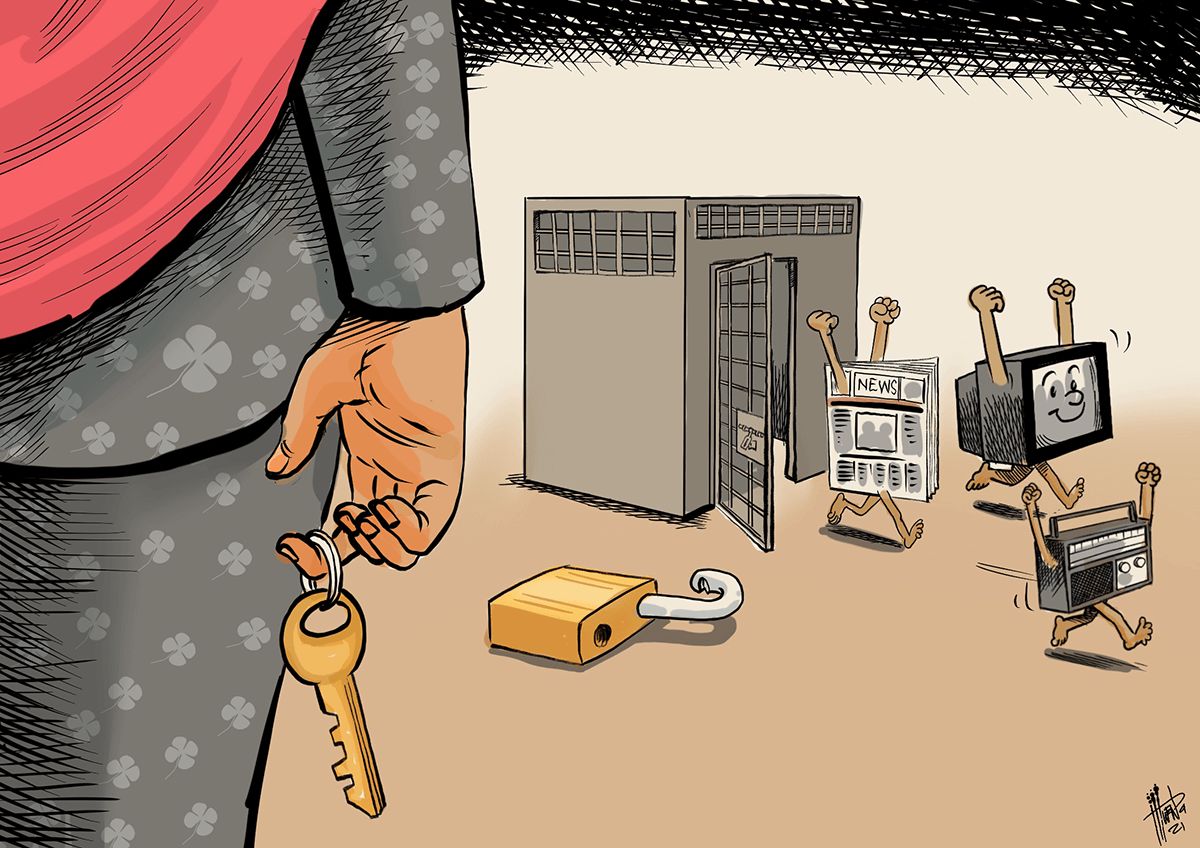
More cases are being dropped, including the one against the former chairperson of the Tanzania Private Sector Foundation (TPSF), Salum Shamte who met his rather untimely death in jail. His son and relative were also released last week in Tanga. Ironically, government tax revenues never dropped after these freedoms related actions, including the disbanding of the once termed tasks forces, which were acting more like hooligans terrorizing businesses and businesspeople in the name of the Republic.
I remember the day the President delivered her maiden speech in the parliament. As we all awaited attentively, quietly, and hopefully to hear of the fate of our nation then engulfed in wide speculations, she delivered a speech that largely insisted on STABILITY and CONTINUITY. Soon thereafter, she appointed almost the same cabinet ministers Magufuli had, almost the same Regional Commissioners (RCs) and almost the same District Commissioners (DCs). It is safe to say the rhetoric have changed, the style has slightly changed, but what hasn’t changed are the individuals. As The Economist aptly puts it in its article on Tanzania’s new president surely can’t be worse than the old one:
Lacking a base within the party, Ms Samia will be concentrating on surviving the early stages of her presidency….
It is obvious that Samia has utilized her first 100 days, not only in defining her presidency, but also in consolidating power within the state and within the ruling party (CCM) as its new chairperson.
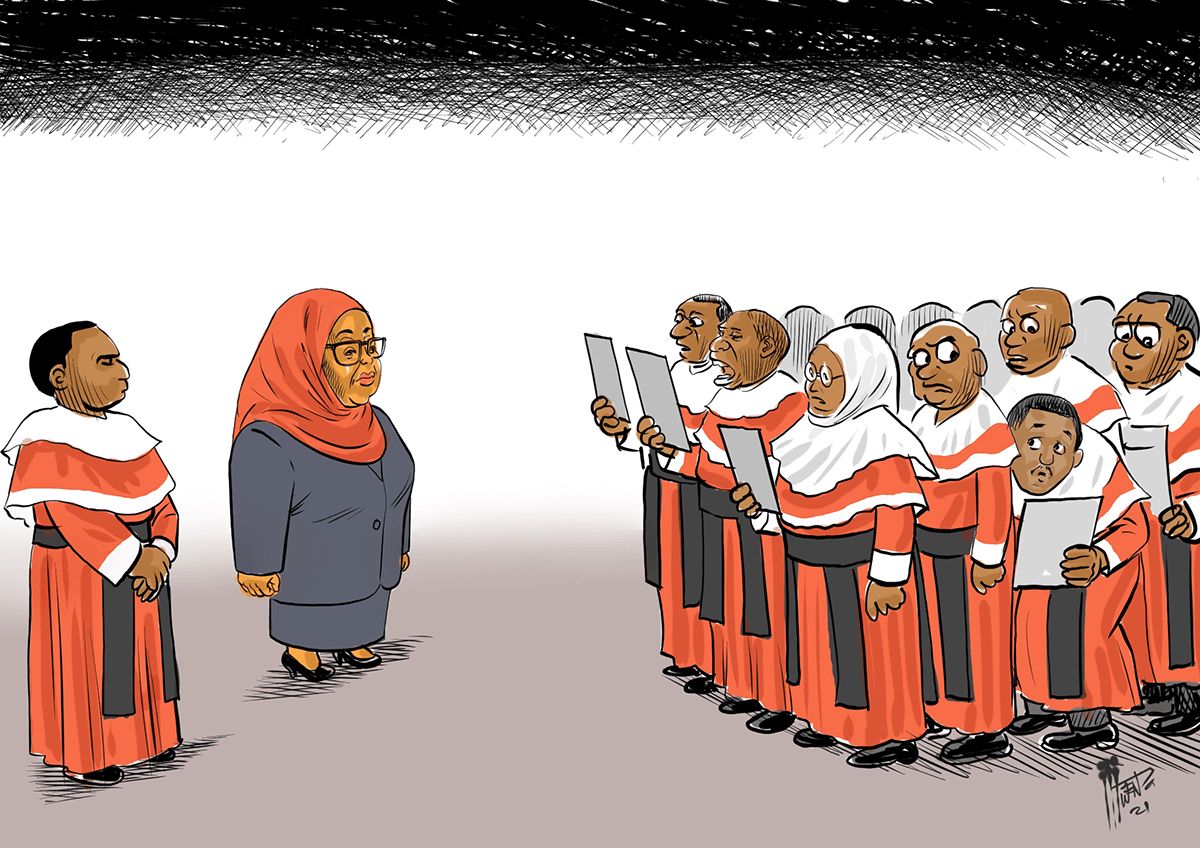
Have the 100 days of Samia’s administration defined what kind of a leader she is? Can we call her a transformative leader? Is she a reformer? Or is she just a perfectionist of the status quo?
I asked the same questions when analyzing her predecessor in his first 100 days. By using the same measures, I attempt to respond to them. To do so, I invoke a similar definition.
In his seminal book titled The Myth of the Strong Leader, Archie Brown describes a “transformational political leader” as “one who plays a decisive role in introducing systemic change, whether of the political or economic system of his or her country or (more rarely) of the international system.” It suggests profound change, a fundamental reconstruction of the system into one that is qualitatively better than what has gone before. It may be very early (just 100 days) to define President Samia; however, the first 100 days may help us to see what kind of a top political leader she would become.
One thing should be clear. Samia took office following the death of a president. As a vice-presidential running mate, she promised nothing in her own right. The most we can use to hold her to account would be her party’s election manifesto of a highly controversial 2020 mis-election. But she has taken actions, which show some direction of change from what went on, after November 2015, when Magufuli came to power.
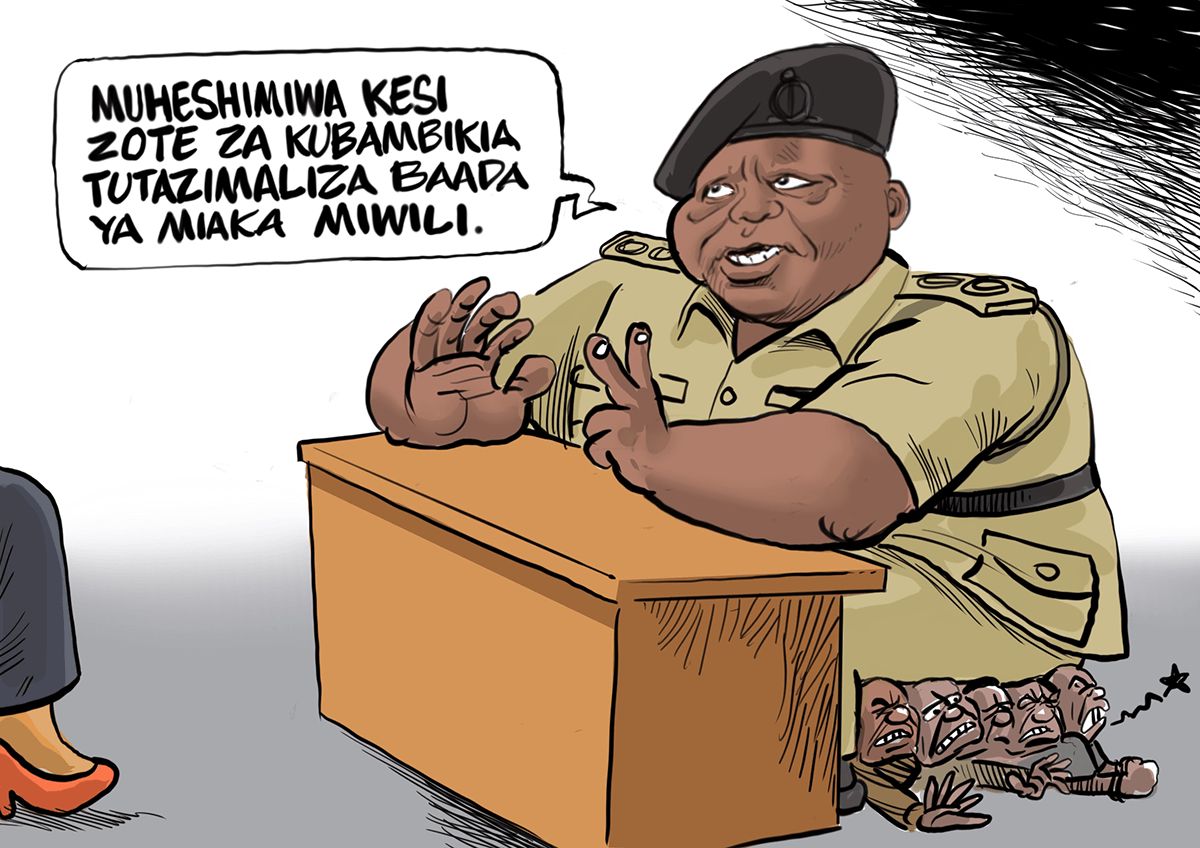
To begin with, there is a ‘new normal’. Samia fired the anti-corruption Czar just as Magufuli did during his first 100 days. In contrast to the time of Magufuli, where many public officials were dragged to court and jails, with Samia we have witnessed the anti- corruption bureau, not just admitting that some people were wrongly accused and framed, but also dropping hundreds of corruption cases. Magufuli used his first 100 days to jail people, but Samia has used hers to free those who were jailed by her predecessor.
It is safe to say that our system has been characterized by impunity. Magufuli’s actions showed that everybody was obliged to live in accordance with the law, except him and his close associates. Samia has shown justice is fundamental in the society. Just like her predecessor, she hasn’t done anything to reform the agencies mandated to uphold the rule of law and ensure law enforcement adheres to principles of justice and freedom.
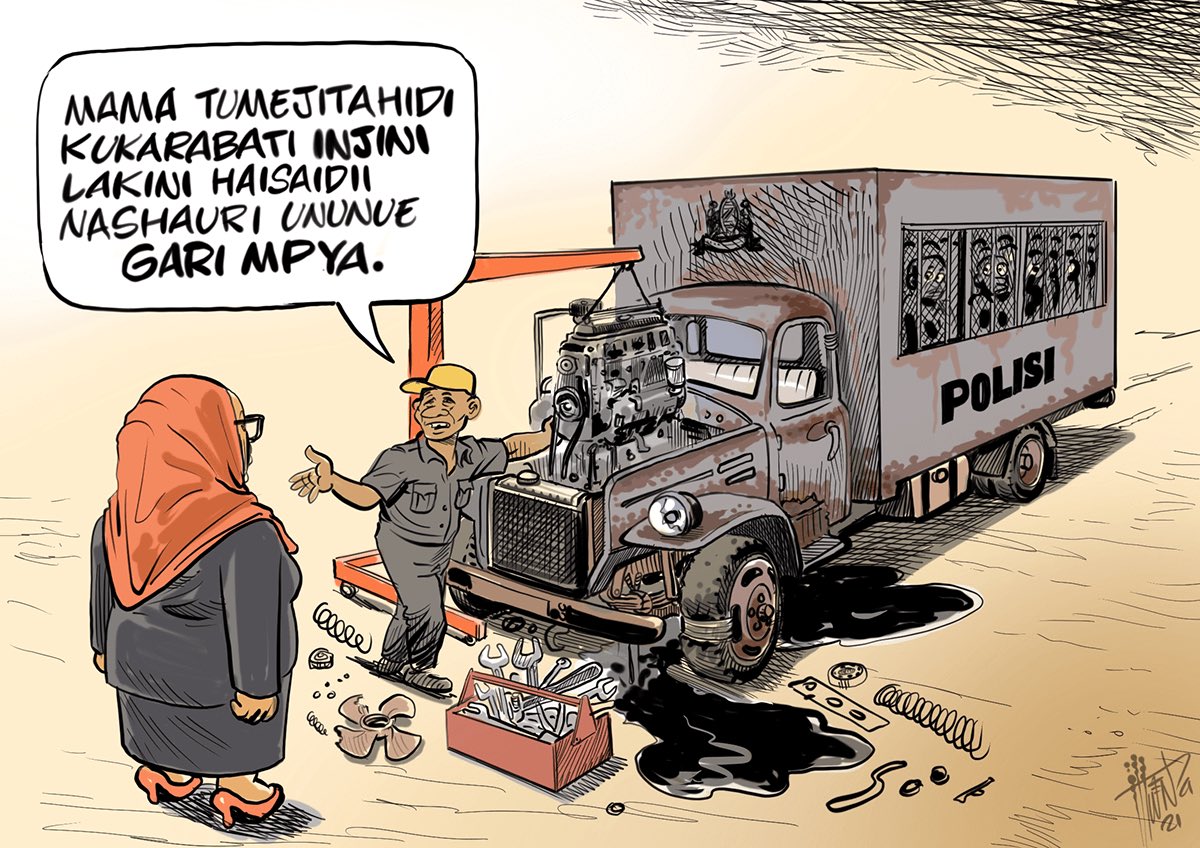
The Prevention and Combating of Corruption Bureau (PCCB) is still the same. It is still an institution without powers to prosecute without permission from the Director of Public Prosecutions (DPP). In her first 100 days, not only has President Samia been quiet about reforming these institutions, but we have also seen no legislative proposals to that effect. Changing heads of these institutions means she is interested in perfecting the existing system, rather than transforming the very system that brought her to power.
This systemization applies to political reforms too. While political parties seem to be free now to move around and run their affairs, the draconian legislations still exist. The call for the process of drafting a new constitution is yet to be heard. There was only a mere passing statement from the President that she has heard the outcry of those demanding a new constitution, but it is relatively far less important, at least for now.
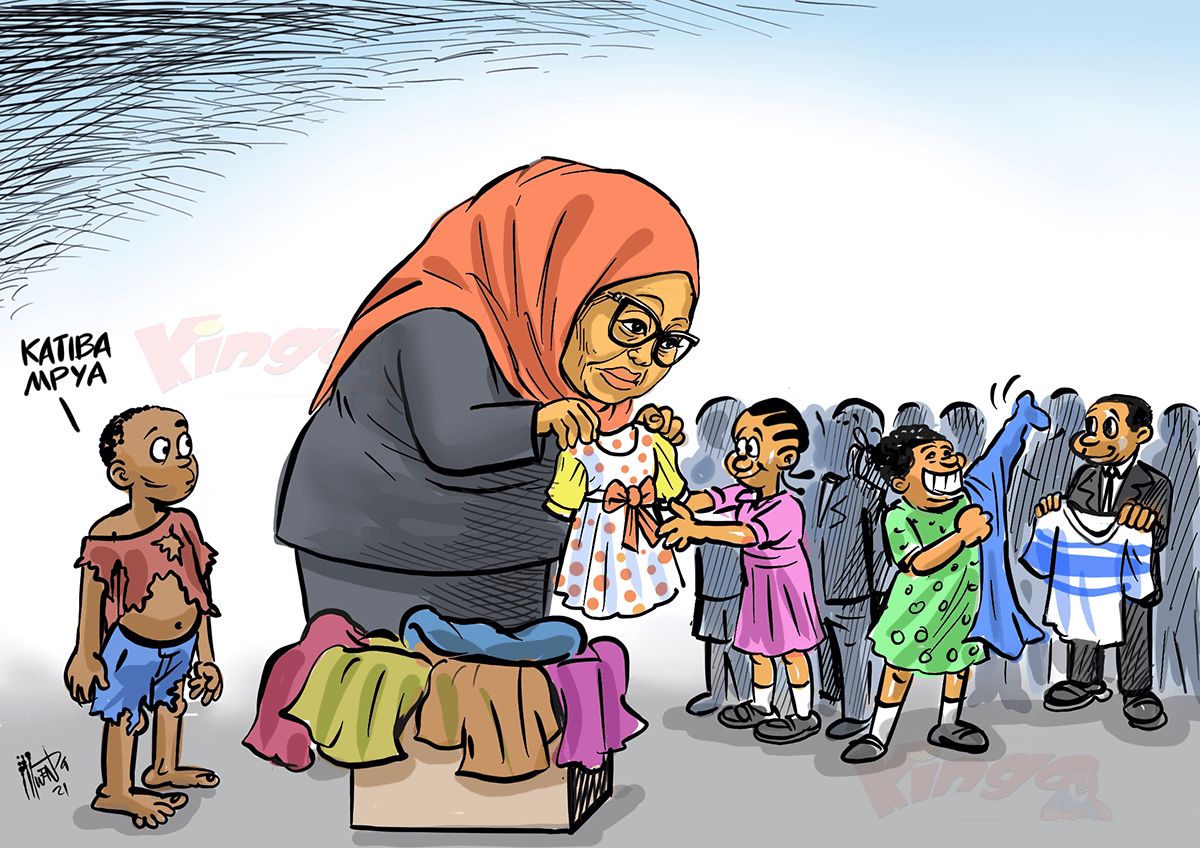
Another issue that I believe is yet to get her attention is the electoral reforms agenda. Perhaps the President is waiting for dialogue with political parties from the opposition camp for these issues to be tackled head on. Yet 100 days have passed without her meeting the leaders from the political opposition. She has however met groups of women, youths, and elders. The latter is obviously a process of consolidation of power.
We haven’t seen the moments of #WhatWouldSamiaDo as we saw during her predecessor’s first overhyped 100 days. Maybe this is because the ‘inventor’ of what became a continentally trending hashtag – #WhatWouldMagufuliDo – on twitter became a devoted critic of Magufuli and now of Samia. She couldn’t burn fingers twice.
Notably, we see a different approach on a very fundamental issue of the fight against the COVID-19 pandemic. It took less than 100 days for the new President to start wearing a mask and making it normal for government officials to do so. It is not enough, but definitely a bold move bearing in mind that her predecessor was a COVID- 19 denier who informally earned his seat in the ‘Ostrich Alliance’ and, with very few exceptions and in very rare occasions, no minister would wear a mask in his presence.
New interventions have been announced, including vaccination. However, to gauge COVID-19 doubters, Samia is not (yet) taking actions commensurate with the gravity of the pandemic. Even amidst the pandemic, she is still cautious. She balances freedoms with consolidation – to people, be free to protect yourselves and, for the state, continue to massage the ego of the dwindling ‘deep state’, which is largely a COVID-19 denier.
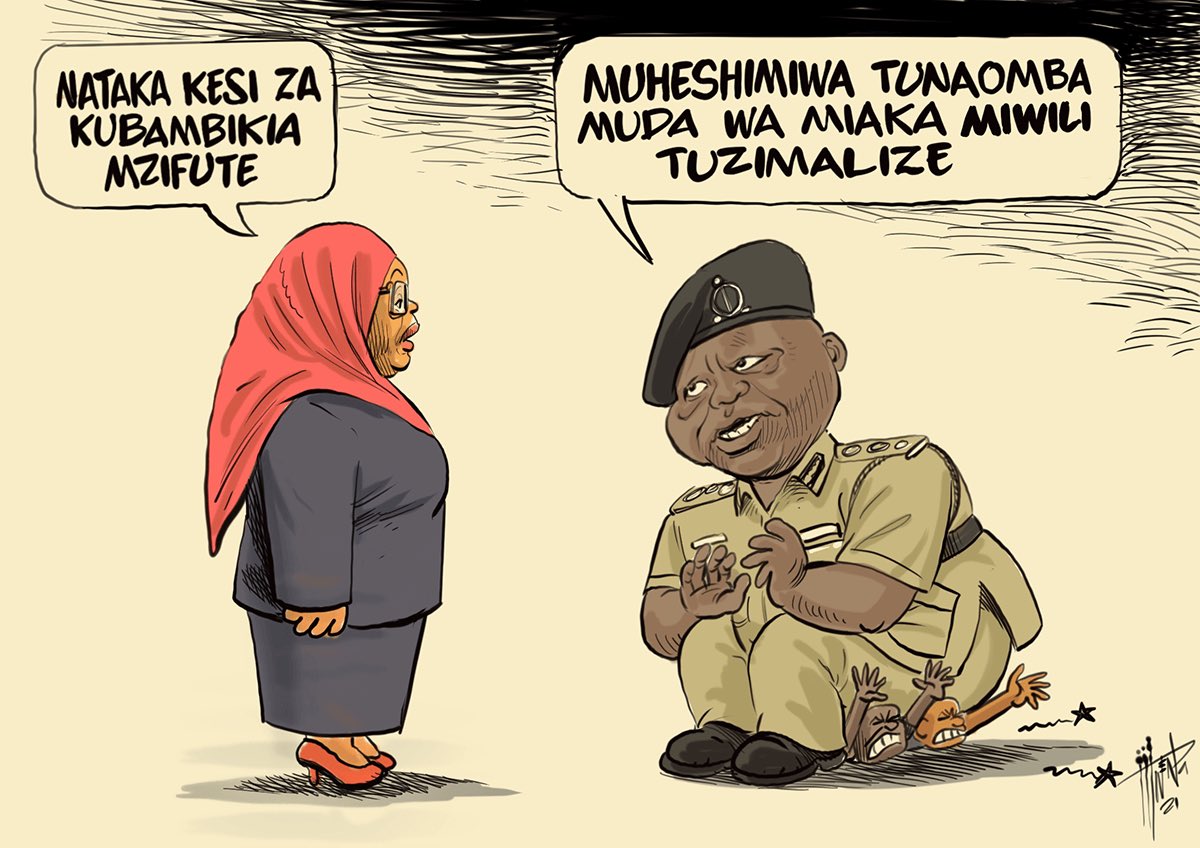
My preliminary judgment of President Samia’s first 100 days is that the status quo of pre-2015 will be restored, albeit with some perfections. Civic space will expand, people will enjoy their freedoms, including freedom of the press, political freedoms, and freedoms to own property without fear of government expropriation. The business environment will improve, we shall witness more Foreign Direct Investments (FDIs) flow, including to the major delayed projects, like the Tanzania Liquefied Natural (LNG) plant in Lindi and the Mchuchuma and Liganga coal and iron mining projects in Ludewa.
Is Tanzania of a perfected pre-2015 status quo enough? Affirmatively, no. To be fair to President Samia, power consolidation is understandable. Surely freedom and justice are inalienable rights, thanks to her for restoring them.
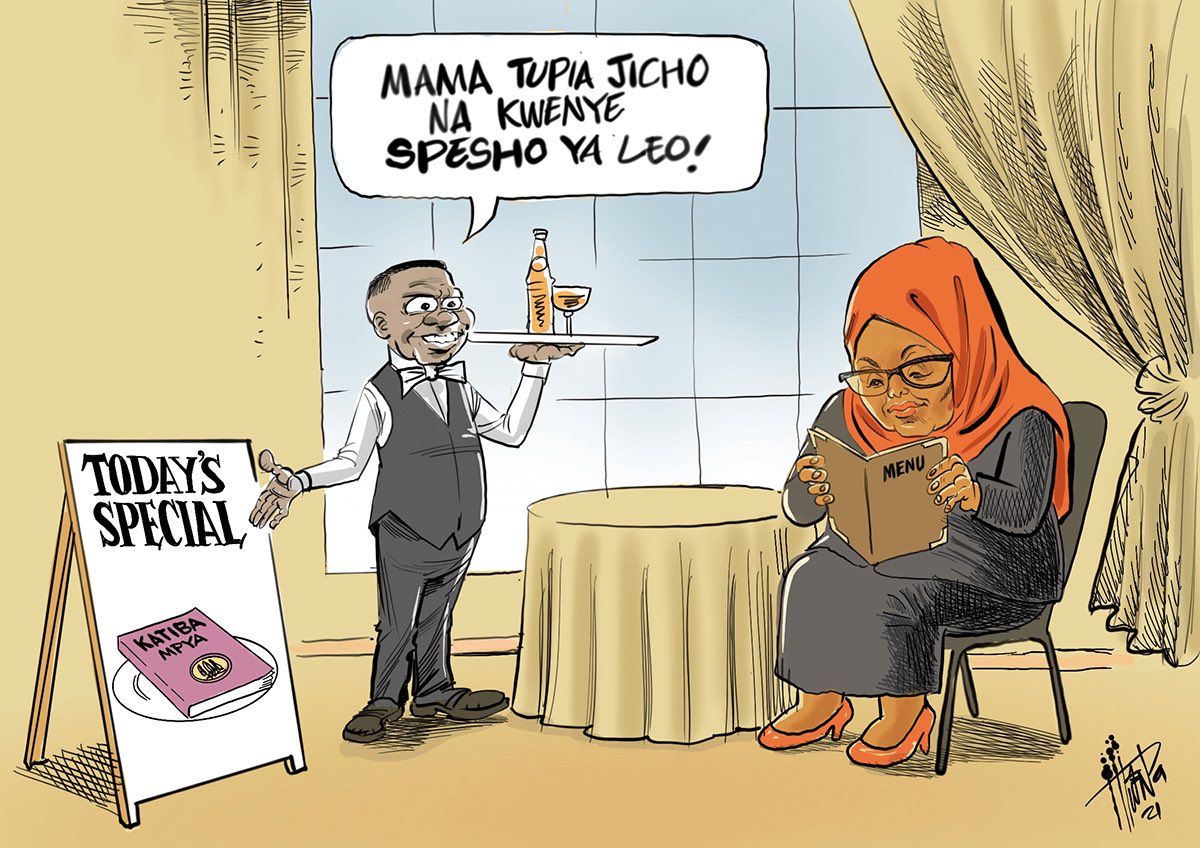
From Brown’s definition, what would then make her a transformative leader? It is the enactment of a new constitution as that would bring systemic change in the country. Sadly, on becoming a transformational leader, President Samia’s journey is yet to begin.
Its good to read. Thanks.
Makala nzuri na rejea muhimu. Kazi nzuri, swali linabaki ni KATIBA MPYA YA WANANCHI.
Mwenyezi Mungu Amlinde Na Kila Shari Watu Wachache Wanaotumia MADARAKA Kwa Kuwakandamiza Wananchi Maskini
Good article bro Zitto, I bet swahili will be there for the mass.
As usual, the article is informative, Samia need to proceed with enactment of the new constitution…and it will be her legacy to this poor nation.
Big up Mdadisi
Mamlaka yatoka kwa Mungu Kutii Mamlaka ni Lazima siyo hiyari Mama asante kwa Uongozi wa Hekima na Busara na Upendo na kujali Katika kipindi hiki cha mwaka mmoja Hongera sana Mama Mungu akupe afya na uzima tele Naamini utatuvusha salama 2025 Barikiwa sana MamaSamia Rais wa jamhuri ya Muugano wa Tanzania
Kudos zitto
Nimepata shaka sana ni nani ameandikiwa hii ni wananchi au ni Rais au ni wote au mabeberu au Mungu kamleta mwandishi kusaidia jamii,nauliza swali,kwa kutumia swali ila napata jibu kwa mfumo wa swali.
A very good narration, let’s wait with Hope,at least we have seen a good will from her
Hongera bro, kazi nzuri ila kama walengwa ni watanzania ni vyema ukaiandika kwa kiswahili hakika ni uchambuzi mzuri na unaotuachia hamu ya kujua ninj kitakachofuata. Ila tusiwe watumwa wa lugha Kiswahili kitukuzwe na wengi watafaidika na kuelewa ulichokiandika.
Leo nipo Korea, Kiswahili kinafundishwa bahati mbaya kwetu kinatumika kiingereza inaleta huzuni bro. Naomba uandike huu udadisi wako kwa lugha ya kiswahili na maoni utapokea mengi
Article is very informative
KESI ZIMEZIDI HATA KAMA MTU ALIKOPA Bank hizi Microfinnancig WANASEMA ni
MUHUJUMU UCHUMI Anakamtwa Na kuwekwa ndani Bila ya MAHAKAMA ANATOZWA HELA NA MALIPO AKIPELEKA
KWENYE ACCT YAO YA MICROFINANCE
HAKUNA RECEIPTS WAMEUNDA TASKFORCES. HAZINA MAMA. AMBIWE
Capitalism must thrive, you’re dexterously requesting for more freedom (on behalf of the capitalists) to roam and exploit TZ. The master is half happy with the first 100 days but they must be completely happy right? A handshake with Dangote, a meeting with Kenyan “business class”, “favourable” environment for multinationals… with all these and she’s still being likened to JPM what more does these people want Kabwe?
A very insightful article. The analysis is adequately rigorous and the conclusions fairly convincing.